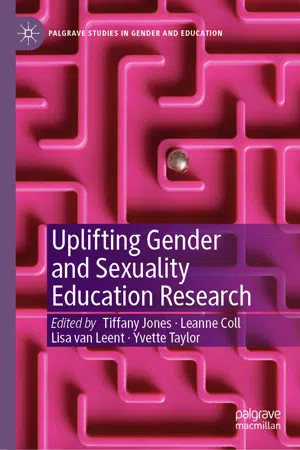
Uplifting Gender and Sexuality Education Research
- English
- ePUB (mobile friendly)
- Available on iOS & Android
Uplifting Gender and Sexuality Education Research
About this book
This book showcases and celebrates the work of Gender and Sexuality Education scholars in order to challenge current negative interpretations of the field, and work towards new shared visions. The editors and contributors call for, affirm and offer examples of pathways towards exciting and dynamic collaborative work in Gender and Sexuality in Education. In doing so, they also acknowledge the various complexities of this field, and detail the context-specific barriers faced by academics and activists. Drawing upon a range of global case studies, this book sets out information and advice from cross-sector experts to set an agenda of mutual supportiveness, and to smooth pathways for future collaboration. Above all, this book is a call to action to uplift the field – and each other – in challenging environments. This ground-breaking book will be of interest and value to scholars of Gender and Sexuality Education research.
Frequently asked questions
- Essential is ideal for learners and professionals who enjoy exploring a wide range of subjects. Access the Essential Library with 800,000+ trusted titles and best-sellers across business, personal growth, and the humanities. Includes unlimited reading time and Standard Read Aloud voice.
- Complete: Perfect for advanced learners and researchers needing full, unrestricted access. Unlock 1.4M+ books across hundreds of subjects, including academic and specialized titles. The Complete Plan also includes advanced features like Premium Read Aloud and Research Assistant.
Please note we cannot support devices running on iOS 13 and Android 7 or earlier. Learn more about using the app.
Information
1. Conceptualisation Landscapes: Overview of Global Gender and Sexuality Constructions
Keywords
ConceptualisationGenderSexualityEducationResearchTable of contents
- Cover
- Front Matter
- Part I. The Landscapes of Gender & Sexuality Education Research
- Part II. Doing Gender & Sexuality Education Research Differently
- Part III. Carving Out Careers in Gender & Sexuality Education Research
- Back Matter